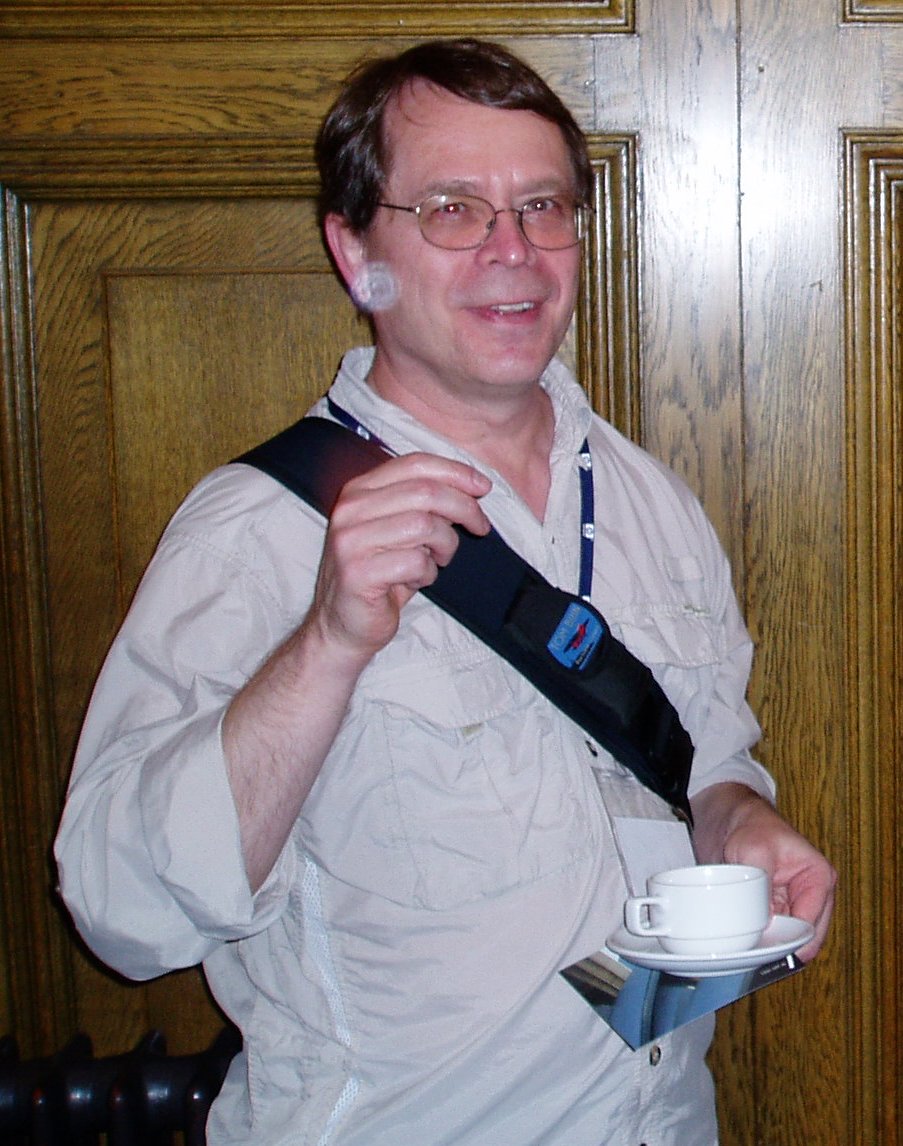|
Mike Karels
Michael J. (Mike) Karels is an American Software Engineer and one of the key people in history of BSD UNIX. A graduate of University of Notre Dame with a Bachelor of Science in Microbiology. Mike went on to University of California, Berkeley for his advanced degree in Microbiology. Mike had access to the department's computer and since the administrator of that PDP-11 did not have enough time, Mike started helping him and then making changes to the system. Mike started his contribution to Unix with the 2.9BSD release, distributed for the PDP-11. When Mike saw a job posting with the Computer Systems Research Group in the BSD project, he decided to jump in. In 1982, Mike took over Bill Joy's responsibilities when Mr. Joy left CSRG, and was the system architect for 4.3BSD, the most important BSD release and the base of the development for a number of commercial Unix flavors available today, including Solaris. This release was introduced to the world in deep detail through the all- ... [...More Info...] [...Related Items...] OR: [Wikipedia] [Google] [Baidu] |
Berkeley Software Distribution
The Berkeley Software Distribution or Berkeley Standard Distribution (BSD) is a discontinued operating system based on Research Unix, developed and distributed by the Computer Systems Research Group (CSRG) at the University of California, Berkeley. The term "BSD" commonly refers to its open-source descendants, including FreeBSD, OpenBSD, NetBSD, and DragonFly BSD. BSD was initially called Berkeley Unix because it was based on the source code of the original Unix developed at Bell Labs. In the 1980s, BSD was widely adopted by workstation vendors in the form of proprietary Unix variants such as DEC Ultrix and Sun Microsystems SunOS due to its permissive licensing and familiarity to many technology company founders and engineers. Although these proprietary BSD derivatives were largely superseded in the 1990s by UNIX SVR4 and OSF/1, later releases provided the basis for several open-source operating systems including FreeBSD, OpenBSD, NetBSD, DragonFly BSD, Darwin, and TrueOS ... [...More Info...] [...Related Items...] OR: [Wikipedia] [Google] [Baidu] |
Berkeley Software Design
Berkeley Software Design, Inc. (BSDI or, later, BSDi), was a corporation which developed, sold licenses for, and supported BSD/OS (originally known as BSD/386), a commercial and partially proprietary variant of the BSD Unix operating system for PC compatible (and later, other) computer systems. The name was chosen for its similarity to "Berkeley Software Distribution" the source of its primary product (specifically 4.3BSD Networking Release 2). BSDI was founded by Rick Adams and members of the Computer Systems Research Group (CSRG) at the University of California, Berkeley, including Keith Bostic, Kirk McKusick, Mike Karels, Bill Jolitz and Donn Seeley. Jolitz, Seeley and Trent Hein were working for Rick Adam's UUNET at the time and became BSDI's first employees when the company began operations in 1991. In December 1991, USENIX Secretary and Former Head of Software at Convex Computer, Rob Kolstad from University of Illinois, was hired and would take over company operations ... [...More Info...] [...Related Items...] OR: [Wikipedia] [Google] [Baidu] |
BSD People
The Berkeley Software Distribution or Berkeley Standard Distribution (BSD) is a discontinued operating system based on Research Unix, developed and distributed by the Computer Systems Research Group (CSRG) at the University of California, Berkeley. The term "BSD" commonly refers to its open-source descendants, including FreeBSD, OpenBSD, NetBSD, and DragonFly BSD. BSD was initially called Berkeley Unix because it was based on the source code of the original Unix developed at Bell Labs. In the 1980s, BSD was widely adopted by workstation vendors in the form of proprietary Unix variants such as DEC Ultrix and Sun Microsystems SunOS due to its permissive licensing and familiarity to many technology company founders and engineers. Although these proprietary BSD derivatives were largely superseded in the 1990s by UNIX SVR4 and OSF/1, later releases provided the basis for several open-source operating systems including FreeBSD, OpenBSD, NetBSD, DragonFly BSD, Darwin, ... [...More Info...] [...Related Items...] OR: [Wikipedia] [Google] [Baidu] |
American Computer Scientists
American(s) may refer to: * American, something of, from, or related to the United States of America, commonly known as the "United States" or "America" ** Americans, citizens and nationals of the United States of America ** American ancestry, people who self-identify their ancestry as "American" ** American English, the set of varieties of the English language native to the United States ** Native Americans in the United States, indigenous peoples of the United States * American, something of, from, or related to the Americas, also known as "America" ** Indigenous peoples of the Americas * American (word), for analysis and history of the meanings in various contexts Organizations * American Airlines, U.S.-based airline headquartered in Fort Worth, Texas * American Athletic Conference, an American college athletic conference * American Recordings (record label), a record label previously known as Def American * American University, in Washington, D.C. Sports teams Soccer * ... [...More Info...] [...Related Items...] OR: [Wikipedia] [Google] [Baidu] |
American Computer Programmers
American(s) may refer to: * American, something of, from, or related to the United States of America, commonly known as the "United States" or "America" ** Americans, citizens and nationals of the United States of America ** American ancestry, people who self-identify their ancestry as "American" ** American English, the set of varieties of the English language native to the United States ** Native Americans in the United States, indigenous peoples of the United States * American, something of, from, or related to the Americas, also known as "America" ** Indigenous peoples of the Americas * American (word), for analysis and history of the meanings in various contexts Organizations * American Airlines, U.S.-based airline headquartered in Fort Worth, Texas * American Athletic Conference, an American college athletic conference * American Recordings (record label), a record label previously known as Def American * American University, in Washington, D.C. Sports teams Soccer * B ... [...More Info...] [...Related Items...] OR: [Wikipedia] [Google] [Baidu] |
Footnotes
A note is a string of text placed at the bottom of a page in a book or document or at the end of a chapter, volume, or the whole text. The note can provide an author's comments on the main text or citations of a reference work in support of the text. Footnotes are notes at the foot of the page while endnotes are collected under a separate heading at the end of a chapter, volume, or entire work. Unlike footnotes, endnotes have the advantage of not affecting the layout of the main text, but may cause inconvenience to readers who have to move back and forth between the main text and the endnotes. In some editions of the Bible, notes are placed in a narrow column in the middle of each page between two columns of biblical text. Numbering and symbols In English, a footnote or endnote is normally flagged by a superscripted number immediately following that portion of the text the note references, each such footnote being numbered sequentially. Occasionally, a number between brack ... [...More Info...] [...Related Items...] OR: [Wikipedia] [Google] [Baidu] |
McAfee
McAfee Corp. ( ), formerly known as McAfee Associates, Inc. from 1987 to 1997 and 2004 to 2014, Network Associates Inc. from 1997 to 2004, and Intel Security Group from 2014 to 2017, is an American global computer security software company headquartered in San Jose, California. The company was purchased by Intel in February 2011, and became part of the Intel Security division. In 2017, Intel had a strategic deal with TPG Capital and converted Intel Security into a joint venture between both companies called McAfee. Thoma Bravo took a minority stake in the new company, and Intel retained a 49% stake. The owners took McAfee public on the NASDAQ in 2020, and in 2022 an investor group led by Advent International Corporation took it private again. History 1987–1999 The company was founded in 1987 as McAfee Associates, named for its founder John McAfee, who resigned from the company in 1994. McAfee was incorporated in the state of Delaware in 1992. In 1993, McAfee stepped do ... [...More Info...] [...Related Items...] OR: [Wikipedia] [Google] [Baidu] |
Wind River Systems
Wind River Systems, also known as Wind River (trademarked as Wndrvr), is an Alameda, California–based company, subsidiary of Aptiv PLC. The company develops embedded system and cloud software consisting of real-time operating systems software, industry-specific software, simulation technology, development tools and middleware. History Wind River Systems was formed by a partnership of Jerry Fiddler and Dave Wilner. Until 1981, Fiddler had worked at Berkeley Lab writing software for control systems, and wanted to pursue a career in computer generated music, which he funded through a consultancy business focused on real-time operating systems. His early clients included the National Football League and film director Francis Ford Coppola, for whom he designed a unique film editing system. Wilner, a former colleague at Berkeley Lab, joined Fiddler to form Wind River Systems in 1983. In 2009, Wind River was acquired by Intel. In 2018, Intel spun out its Wind River division, which ... [...More Info...] [...Related Items...] OR: [Wikipedia] [Google] [Baidu] |
UNIX
Unix (; trademarked as UNIX) is a family of multitasking, multiuser computer operating systems that derive from the original AT&T Unix, whose development started in 1969 at the Bell Labs research center by Ken Thompson, Dennis Ritchie, and others. Initially intended for use inside the Bell System, AT&T licensed Unix to outside parties in the late 1970s, leading to a variety of both academic and commercial Unix variants from vendors including University of California, Berkeley (Berkeley Software Distribution, BSD), Microsoft (Xenix), Sun Microsystems (SunOS/Solaris (operating system), Solaris), Hewlett-Packard, HP/Hewlett Packard Enterprise, HPE (HP-UX), and IBM (IBM AIX, AIX). In the early 1990s, AT&T sold its rights in Unix to Novell, which then sold the UNIX trademark to The Open Group, an industry consortium founded in 1996. The Open Group allows the use of the mark for certified operating systems that comply with the Single UNIX Specification (SUS). Unix systems are chara ... [...More Info...] [...Related Items...] OR: [Wikipedia] [Google] [Baidu] |
Jacobson/Karels Algorithm
Transmission Control Protocol (TCP) uses a network congestion-avoidance algorithm that includes various aspects of an additive increase/multiplicative decrease (AIMD) scheme, along with other schemes including slow start and congestion window (CWND), to achieve congestion avoidance. The TCP congestion-avoidance algorithm is the primary basis for congestion control in the Internet. Per the end-to-end principle, congestion control is largely a function of internet hosts, not the network itself. There are several variations and versions of the algorithm implemented in protocol stacks of operating systems of computers that connect to the Internet. To avoid congestive collapse, TCP uses multi-faceted congestion-control strategy. For each connection, TCP maintains a CWND, limiting the total number of unacknowledged packets that may be in transit end-to-end. This is somewhat analogous to TCP's sliding window used for flow control. Additive increase/multiplicative decrease The addi ... [...More Info...] [...Related Items...] OR: [Wikipedia] [Google] [Baidu] |
Van Jacobson
Van Jacobson (born 1950) is an American computer scientist, renowned for his work on TCP/IP network performance and scaling.2001 SIGCOMM Award for Lifetime Achievement to Van Jacobson "for contributions to protocol architecture and congestion control." He is one of the primary contributors to the TCP/IP protocol stack—the technological foundation of today’s Internet. Since 2013, Jacobson is an adjunct professor at the (UCLA) working on |



